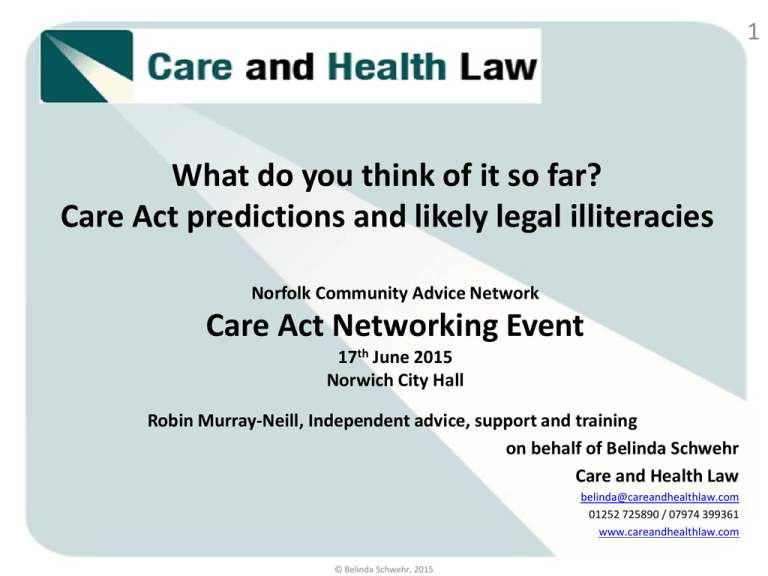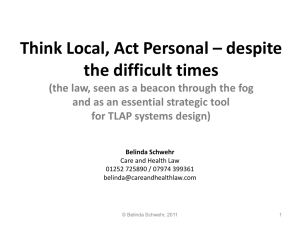Let's compare what we've been told the Act will deliver or achieve
advertisement

1 What do you think of it so far? Care Act predictions and likely legal illiteracies Norfolk Community Advice Network Care Act Networking Event 17th June 2015 Norwich City Hall Robin Murray-Neill, Independent advice, support and training on behalf of Belinda Schwehr Care and Health Law belinda@careandhealthlaw.com 01252 725890 / 07974 399361 www.careandhealthlaw.com © Belinda Schwehr, 2015 Let’s compare what we’ve been told the Act will deliver or achieve, with the real world situation…. •… To make advice, information, prevention and independent advocacy accessible, to help people to help themselves, first and foremost – The risk: the existence of these things depends on councils spending money to ensure accuracy and comprehensiveness (ie info and advice) and the knowledge and skills base (ie advocacy) – and replace what’s actually closed, due to the cuts (ie resurrecting prevention services) © Belinda Schwehr, 2015 2 Let’s compare what we’ve been told the Act will deliver or achieve, with the real world situation…. •…To put wellbeing first, by requiring its promotion – The risk: the woolliness of the features that make up wellbeing, makes this duty legally unenforceable in all but extreme situations – so woolly that it’s almost impossible to prove that a council wasn’t actually trying. © Belinda Schwehr, 2015 3 Let’s compare what we’ve been told the Act will deliver or achieve, with the real world situation…. •To deliver person-centred assessment and care planning – The risk: public confidence in this intention was raised sky high by the spin accompanying the Act and may well implode, on the realisation that decision-making is left in the hands of council officers. The fact that there is no time limit on the period that the customer journey should take, or the number of times a council can offer prevention suggestions to someone on may be grossly exploited, with minimum risk of challenge. © Belinda Schwehr, 2015 4 Let’s compare what we’ve been told the Act will deliver or achieve, with the real world situation…. •… Consistency, through the national minimum eligibility threshold, based on an ‘assets’ and strengths-based approach – The risk: determinedly upbeat assessors make people reluctant to present themselves as unable to achieve, with consequential significant impact, and hence lose eligibility. Plus the absence of any national assessment form template may lead to chaos. © Belinda Schwehr, 2015 5 Let’s compare what we’ve been told the Act will deliver or achieve, with the real world situation…. •…widespread supported self assessment – The risk: customers believing that this simply MUST mean that they get to decide whether they are unable to achieve, or whether they are experiencing consequential significant impact; and councils being so attached to online processes that they end up offering this mode to people lacking capacity or to people who should have had an advocate. Or even allowing the scoring of a form to determine consequential significant impact, instead of the customer’s representations on this topic, being appropriately considered by a professional, and their judgement applied. © Belinda Schwehr, 2015 6 Let’s compare what we’ve been told the Act will deliver or achieve, with the real world situation…. •… new rights for carers – whilst omitting to include a chapter in the guidance that would alert them to these new rights. – The risk is either too many carers get the idea that they don’t have to care, and that the State will pay – or councils fail to get the funds from government to support willing carers, and thus do not meet the funding shortfall arising from the demographic timebomb of all those people with cognitive impairments, and no relatives to help them. © Belinda Schwehr, 2015 7 Let’s compare what we’ve been told the Act will deliver or achieve, with the real world situation…. • …promises to deliver personal budgets and direct payments – whilst making getting one’s services through the council the most economically rational thing we would all naturally want to do. – The risk is that people will realise that a direct payment only makes sense if the budget is enough to cover the extra cost associated with being an individual purchaser – and then there will be litigation about whether that extra cost is to be denied on the basis that a direct payment is a want rather than a need, or that the customer will just have to make savings, given the legal definition of a personal budget: the cost to the council of meeting needs…. © Belinda Schwehr, 2015 8 Let’s compare what we’ve been told the Act will deliver or achieve, with the real world situation…. •… promises to make safeguarding personal – without giving any further clues about what councils can and cannot legally do, to intervene in very personal aspects of a person’s life. – The Act only does three things, really: it makes the threshold for an enquiry very low, without distinguishing abuse and neglect from accidents or negligent harm; it gives enormous discretion to councils as to what constitutes a good enough enquiry, and who should do them – and puts partners’ relations with each other before and after safeguarding scenarios on an uneasy footing - by making Safeguarding Boards mandatory and governed by rather vague provisions focusing on co-operation. – Meanwhile the case law continues apace, highlighting that councils are still legally in the dark about whether or how calling a process ‘safeguarding’ makes any difference to duties and powers towards the vulnerable. © Belinda Schwehr, 2015 9 Let’s compare what we’ve been told the Act will deliver or achieve, with the real world situation…. •The Act promises freedom to disabled people to be able to move around the country and live where they wish… – but makes deemed continuing ordinary residence (a relationship with one’s current council) depend on whether the care planning staff put some magic words into one’s care plan before one goes – Even the DH’s Legal Literacy materials point this out as an area of ambiguity and potential challenge – with new rules about o/residence and s117 liability having seemingly been drafted by sleepwalkers! © Belinda Schwehr, 2015 10 Let’s compare what we’ve been told the Act will deliver or achieve, with the real world situation…. •Promises to ease transition from children’s services to the less politically sensitive adults’ services culture – but makes Children’s Services continue to pay, until adults services is ready and it suits everyone else! The risk here is that well informed parents will appreciate that asking for a transition assessment just brings the day closer when Children’s Services stops funding, and Adults has to start; and why anyone would want that day to be brought forwards is beyond me. A duty to co-operate would have to have miles more teeth in it, to avoid turf wars there, I believe. © Belinda Schwehr, 2015 11 Let’s compare what we’ve been told the Act will deliver or achieve, with the real world situation…. 12 • Promises providers that commissioners will work in partnership – but does not explain that it isn’t actually illegal to use the fear of competition that exists between providers, in order to keep the price low; nor that elected Members might be better off letting social care off the cuts, rather than making all Directors take the same cuts, given that there’s a big legal difference between a statutory duty, and a mere discretion. – The message needs to be that Reserves do sometimes have to be spent – if the market keels over, for instance, from commissioning which is too harsh for ‘sustainability’. – The political message is that a mixed economy of care works well, whereas in reality, there is no partnership with the private or voluntary sector – the relationship is one based on market forces. actual inter-dependency, but legal illiteracy about why, on both sides. What a basis for a relationship! © Belinda Schwehr, 2015 Let’s compare what we’ve been told the Act will deliver or achieve, with the real world situation…. •Promises to make integration the natural way forward for maximising the value of ‘the local health and social care pound’ – but makes access to the money for it, now safe in the Better Care Fund, depend on meeting NHS targets – instead of acknowledging that agencies have been able to integrate by way of pooled budgets and swapped functions, since 1999 – and it hasn’t worked yet! © Belinda Schwehr, 2015 13 Let’s compare what we’ve been told the Act will deliver or achieve, with the real world situation…. •…that no-one need spend more than £72K on one’s care costs – but ensures that one has to live for at least 4 years in a care home, which is not statistically likely, before the council has to pay for free care. The risk is that the Dilnot provisions will be watered down in a post-election negotiation; or that the market remains disinclined to provide information and advice without the prospect of there being a financial product to sell, for covering against the cost. The real concern is destabilisation of the care home market, once the private client subsidy evaporates, leading to the very uncomfortable need for social workers to take people home with them from work, since the legal duty is either to purchase – or else to go back to providing…in order to meet assessed, eligible, unmet needs. © Belinda Schwehr, 2015 14 Let’s compare what we’ve been told the Act will deliver or achieve, with the real world situation…. 15 •… to re-professionalise the workforce to make defensible decisions – but gives them no guidance on what is significant impact. – The answer is to teach them that they are the decision makers, and they have the power to create consensus about that – consensus that would be respected by the courts, as long as it was articulated well – that’s what we mean when we focus on what judicial reviews do – they address unjustifiable arbitrariness, not professional differences of opinion. – There is no doubt that advocacy will raise everyone’s game over time. But unless a culture of reading is reintroduced, and personal responsibility for one’s remaining up to date, I don’t see any means by which councils are to be held to account for the level of Care Act knowledge, and the skill in using that knowledge, of the staff. © Belinda Schwehr, 2015 Other headline changes 16 • Fines for delayed discharges to become discretionary, because of good joint working and the better Care Fund agreements between Health and Social Care • A streamlined charging system with a new focus on mental capacity regarding finances and sharing financial information • Deferred payment arrangements for anyone meeting financial/other criteria, and a principle of debt recovery only after you have offered a deferred payment • New quality standards for providers • New human rights status for providers • A new criminal offence about false and misleading information • A new proactive duty of candour • A new form of appeal, by 2016. © Belinda Schwehr, 2015 Some scenarios to challenge your thinking! • A council spends £14 an hour on care. An eligible person wants £16 per hour, by way of a direct payment - not for a luxury service but because the local market charges individuals more than it charges the council, because you of course, buy in bulk and pay quickly and accept a standardised service. • What would you expect your staff to say? • A person with epilepsy wants to go to live in Sutton in a specialist provider’s flats on HB – he wants you to continue to pay for him, and the flats count as ‘specified accommodation’. Trouble is, the care package charge is £2300 a week. There is no cheaper competitor there, but there is one here. • Must the council accept liability for the person’s understandable desire to move to somewhere else? © Belinda Schwehr, 2015 17 18 • A carer who is well informed about carers’ rights is on a package that costs £375 a week – it covers respite. The service user’s other needs cost £450 a week to meet. The cost of a residential care service is £650 a week. • Is it going to be your council’s policy to continue to support the carer’s interest in caring for ever, no matter what the cost? • A person refuses assessment – it’s known that they are living in squalor, without amenities, but it’s not known why. The neighbours are beside themselves about the risk to others. The person tells your staff that it is their life, and their choice. • Does the council think that self neglect triggers the duty to make a safeguarding enquiry? Can it afford to, in terms of the resources thereby needed? • The council’s asserted usual rate or guide price for care home care, is £450 a week but only 20% of care homes in the area take that rate – the rest ask for top ups. The providers are also lobbying for an increase in the standard rate, and threatening to bring judicial review proceedings. Officers tell members that the mood is angry. • Does the Council simply accept insufficient funding from central government rather than make a fuss about the irrationality of the funding settlement? Or expect staff to manage within budget, regardless of the mandatory nature of the duty to meet the needs. Or expect private sector businesses to make savings year on year, even though the cost of provision is not remaining the same? © Belinda Schwehr, 2015 Why read this presentation? • • • • 19 Advisers who are relatively unschooled in social care law need to understand how this particular branch of the law works: this is public law, and it’s full of margin for the unique and unpredictable situations in which the job has to be done – it is hard to bring a successful challenge against a council in this sphere, even though when it happens, lawyers think it will change the world. Social services staff are very poorly taught about the interplay between statutes, guidance and caselaw at the degree stage and receive hardly any CPD in it, so the Care Act has been a bit of a shock for them. Public law duties are not the same as negligence: councils have a duty TO care, rather than OF care. That is, there are statutory duties to discharge, and that must happen - even if the department runs out of money – the duties are council corporate duties; and if they are not done, the council can be challenged – but not just for doing them in a less than careful way or poorly. That is what the complaints system and the ombudsman are for. The courts have actually given councils protection against actions in negligence, or damages for breach of statutory duty, in the social work managerial context – even in safeguarding - for public policy reasons. Councils neither choose to take on these duties – they are mandatory – and they are underfunded by central government – and usage of tight resources is not normally seen as justiciable – and there is no equivalent to the function of assessment and care planning and provision in private law, in contrast to the position of those in the medical profession and working in the NHS. So public law is all that there is, for ensuring any kind of consistency. Even that will disappear, if we are not careful, once the so-called ‘appeal’ system is brought in – there will be 150 councils making 150 different sorts of decisions on the very same legal provisions, and no-one taking them to court any longer, because the probably non-legally qualified (and free) external reviewer will highlight the most extreme, and the councils will settle the appeals without any precedents ever being set. © Belinda Schwehr, 2015 Things to look for in local practice With statutory duties and discretions, the bigger risks arise from a council • Not doing them at all, or taking unfeasibly long about it – Eg: not providing advocacy where it is acknowledged to be necessary – Not offering direct payments for a particular client group not excluded from the opportunity – Stretching the assessment phase out, by offering prevention again and again, and never saying when they will get to an eligibility decision • Not doing them sensibly, or in accordance with the guidance, without a good reason! – Eg: running a waiting list for a scarce resource based on alphabetical order instead of need – Not giving reasons for why an offered package or budget is considered to be enough.. • Not doing them legally, within the words used in the Act or Regs – or ignoring the statutory purpose – Failing to allow a person to require the involvement of a nominated person in a decision where this is required, or regarding their relative as their informal supporter without getting the person’s consent or making a BI decision. – Imposing a condition on a direct payment recipient that negates the whole point of the offer – choice/control • Fettering discretion or not doing decision making fairly, so far as procedural fairness rules are concerned... – Failing to consider giving a person direct payments to spend on a close relative in the same household – Not allowing a person to make representations in respect of their position on ability to achieve or what is wrong with the suggestion that a service available for free locally could appropriately meet a person’s needs. And with a new piece of legislation, in an era of government cuts, the real risk comes from • Not understanding what’s changing, or where to check that out – staff don’t know what they don’t know, or when they are on a legal wobble… • Not following guidance because the staff are not familiar with it – there is no culture of self-starting for study purposes in adult social care…or even private reading! • Not being ready to be challenged, and thus driving people to visit likely looking lawyers…lots of councils are run on a command and control basis, with staff genuinely afraid to raise questions about legality, and that spreads to the relationship with customers, in the end. © Belinda Schwehr, 2015 20 What’s the position about old and new clients? People who are already receiving services and support (including direct payments) prior to 1 April 2015 will continue to receive such support and services under the old law until the local authority completes a review of that person’s case, at which point the new law will apply in respect of that person. In practice, such a review can have one of two basic outcomes: • the local authority concludes the person does not have care and support needs that they are required to meet under the Care Act (for example because needs do not meet the eligibility criteria), and the authority does not intend to meet any of the person’s other needs; or • the local authority, having concluded that the person does have needs and that they are going to meet some or all of these needs, starts to do so (assuring itself that existing arrangements fully comply with the Care Act, making any adjustments as necessary). • In my view, any change to the content, or value of the care plan, means the plan is changing and will need to comply with the revisions section (s27) and that any plan – even if not actively changing, will need to comply with s25 – the requirements for a lawful Care Act statutory plan. © Belinda Schwehr, 2015 21 22 What the DH requires of councils now • Reviews of existing care and support plans will usually take place at least annually. Therefore, it will usually be most pragmatic for the transition under the Care Act to take place at the point of the planned, regular review. In any event, local authorities must undertake a review within one year of the implementation of the Care Act (i.e. before 1st April 2016). • If they do not, the Care Act will apply as of this date and anyone who has not been reviewed will be treated as having their eligible needs met under the Care Act until the local authority does, in fact, complete a review and reach a decision in accordance with the Care Act. • Local authorities must not use existing legislation to underpin care and support planning or provision after 1st April 2015 in respect of cases other than these transitional cases. The purpose of the saving in the Order is to enable local authorities only to continue with existing arrangements pending a review, so as to plan a managed transition over the first year. © Belinda Schwehr, 2015 First contact foolishness – nb a non-statutory stage • Not reconfiguring First Contact services, so as to have at least some senior qualified or very experienced staff up there – with antennae, for sensitive decision-making confidence, and legally aware supervision… regarding for example – who should and could not be offered Supported Self Assessment in terms of capacity; who needs a face to face assessment; who needs an advocate, given their difficulties and the stance of their relatives? • Setting up implicit thresholds to getting past this point, on to assessment ‘proper’ - like one’s IQ, severe or enduring mental illness, having a diagnosis, etc • Getting the level, skill factor or even the basic question of urgency wrong for a proper assessment beyond your ‘front door’. • Not at least offering people ‘a supported self assessment’ if they do have capacity to take part in one, and wish to, (everyone having understood what an SSA really is and is not!) and not allowing them to say who they want involved, and involving them in the process as per the statutory rules. • Turning people away at this or an even earlier point, without identifying whether you are A) purporting to be actually denying them an assessment and if so, why, B) saying that they have just actually had one from you (without their realising it) and that they’re not eligible – even though some will have deserved an advocate - or C) just saying ‘Try this first, and let us know whether it works....’ without following up • Saying no on the basis of an ignorant view of ordinary residence rules • Saying no on the basis that they’ve not moved here yet... • Saying there is no point because ‘we don’t do shopping/cleaning/meals/transport etc’! © Belinda Schwehr, 2015 23 Advocacy accidents 24 • Failing to spot someone would experience substantial difficulty, at the right point. • Not having commissioned enough, so that assessment or other stages are delayed. It’s a duty! • Failing to appreciate that supported self assessment (as defined!) could be offered to the person if they actually had an informal involver or, in default, an advocate – all it takes is sufficient capacity to take part – that’s not what the guidance says, mind you! • Forgetting to get the consent of the person to the informal support from their informal involving person – most councils will assume people’s relatives are wanted as supporters • Finding willing involvers to be inappropriate for obviously challengeable reasons • Finding unwilling involvers to be appropriate, regardless, and thus failing to appoint • Forgetting that alongside advocacy, a person has a right to require a council to involve a person of their own choosing, and that wider other people are best interests consultees of people lacking capacity, in whose wellbeing they are interested, unless or until a council decides that to be inappropriate or impracticable... • Overlooking the exceptions to the exception: ie where, notwithstanding the existence of a willing and appropriate informal involver, councils must appoint an independent advocate in any event!! (conscientious as opposed to rabid material disagreements) • Appointing people who don’t have any training, or knowledge, or working towards the new qualification within a year... • Appointing insufficiently independent people – tricky because the regs fail to make it clear as to whether it is a contracted advocacy organisation that must be independent, and not otherwise working for the council - or the advocate, him or herself, in person…. © Belinda Schwehr, 2015 Prevention Pitfalls 25 • Signposting, without finding out if there are actually vacancies or services out there still! • Assuming that people can buy their own: no good if the services are not affordable to ordinary people – a perverse disincentive to take personal responsibility, if it’s cheaper once one is eligible • Not focusing on whether the ‘prevention’ is to prevent one from becoming eligible, or to prevent their becoming even more eligible; or whether it is to reduce their eligible need or to reduce it more so that they are not eligible. This matters because of where the council must put the service: in the plan, which leads on to the chance to take funding as a direct payment, or on the way to an assessment, as an offer to all those ‘suited’ to it for (eg equipment, reablement or counselling for motivation). If it’s in the plan, it counts towards the independent budget, unless specifically excluded by Regs. • Not listening conscientiously as to why a person won’t avail themselves of preventive services, but then taking that into account as relevant to significant impact considerations at the eligibility stage. If councils want to be brave and take it as relevant to significant impact, they’d need to make sure that there was no very good reason, or only a completely indefensible one, like racism, for the person’s having turned down access to preventive or universally available services which were available at the time. • Getting in a mess about what can be charged for if merely preventive, and what can’t be. There is a separate charging power in the Act and Regs for prevention services, so in principle, councils CAN charge – but not if it’s reablement or intermediate care (a programme…) and nb they can’t charge for equipment they provide in any circumstances. Different if an outside provider is selling the equipment to the person, eg in extra care. © Belinda Schwehr, 2015 Assessment aggravations and eligibility embarrassments 26 • Taking a person’s refusal of assessment at face value instead of following section 11. • Not covering all of the domains that an assessment should cover, in the name of minimum process or the client’s say-so. The client is not the real decision maker, even if fully capacitated, or even when they’re saying that they’ve not got a particular problem with a given domain within an assessment. • Overlooking the definition of inability – it is a stretched one. So even if staff start out focusing on the person’s assets and strengths, it doesn’t mean that they don’t count as unable to do something – for instance, if they are getting assistance, so don’t see their difficulty as a big problem….many people will have not been told this! • Overlooking the need to be carer blinkered in relation to ability or impact – ie forgetting that staff must assess the person’s ability and the impact of inability, without regard to the existence of current help. • Appearing not to be taking any account of desired outcomes or the person’s own view of the impact arising from the difficulty – this would make it difficult to exercise discretion about meeting non eligible needs at the planning stage too. • SMT running a panel that goes as far as second guessing staff’s decisions on eligibility but not giving the workforce any steer on what is significant impact on well-being, or how to measure it. • Paperwork with no spaces for the client/involver/carer/any relevant person’s advocate to assert a different view. © Belinda Schwehr, 2015 More elaboration to which councils must have regard because the guidance says so – but is it even correct? 27 “maintaining a habitable home environment” [note: no reference here to the adult’s ability to do this for themselves….cf the other domains in the regs…] The guidance says this: • Local authorities should consider whether the condition of the adult’s home is sufficiently clean and maintained to be safe. • [ie consideration of their environment, not the person’s active capability]. The 2 examples in the guidance follow this approach, and treat the fact that the carer does the cleaning as enabling no finding of eligibility on this domain. Of course if the carer is able and willing then there is no duty to meet the need, but that doesn’t mean that the person is not eligible in a s13 context. If the person is eligible based on inability to achieve in two or more areas, plus significant impact on wellbeing, then that is an important finding for process and paperwork under the Act. The guidance is probably not lawful here: the regulations make needing assistance including even prompting key to the decision about inability to achieve. Plus the guidance itself says to ignore the help from a carer, so is not even consistent with itself. © Belinda Schwehr, 2015 Care Planning - budget bungles and RAS wrangles • • • • • • • • • • • • • • • 28 Having a Resource Allocation system that is based on fantasy figures and global deflations and 0 pounds for points relevant to the outcomes in the regs, without any good reason. Not making it clear that the indicative allocation is only a benchmark, not an offer, much less a take it or leave it offer! Funding up to the cost to the authority, and never any more than that. Ignoring s25 on what a care plan must have in it. This is not optional. Ignoring Choice of Accommodation legal requirements or misinterpreting them – eg a policy that we “keep people in the borough” by reference to the rate there. The Annex on Choice is explicit on taking the rate in the area chosen even if it the move is not “needed”. Running a different sort of a RAS for care homes: an arbitrarily low allocation for people needing that response undermines their choice rights, and risks extracting top ups inappropriately Running an online purchasing system for framework providers which generates offers against anonymised needs, but treating the lowest suitable offer as the personal budget and anything more as a top up. Offering the deployment route of a direct payment without having sorted out how the direct payment version of a PB will really need to be run – capacity considerations, an Authorised Person scheme, signing off of conditions for the award of a direct payment, providing free support or admin services to attract people to this option vs extra budget to ensure people can choose a manager? Not monitoring whether DPs are working, and thus spotting safeguarding issues in a timely manner. Signing off care plans with far too little response or money, to meet needs, with no evidence basis. Not commissioning services, or funding DPs, for objectively reasonable preference or sufficiency and holding customers to that inadequate discharge of responsibility = “you can make the savings for us!” Saying no to funding a direct payment on the basis of evidence as to why it costs a bit more for an individual than for the council to buy a particular service, or ‘No’ simply because of the cost. No reasons given for why a given offer of anything is rationally believed to be enough to be appropriate. Ignoring the MCA at the care planning stage and getting into more Somerset or Cheshire West or Milton Keynes moments Ignoring any other relevant and applicable legal principle, including human rights. © Belinda Schwehr, 2015 Direct Payment disasters 29 • Giving them to people who lack capacity to request a direct payment, direct to them – and then regarding them as accountable for misuse – illegal since 2009, as it happens! • Refusing people a direct payment when they have enough capacity to request one, without a good reason (eg the council doesn’t like their nominee – that’s not enough of a reason even under the new law.) • Thinking that the council could buy the service for less, because it’s been so good at crushing the market with its dominant purchasing position – and offering less – or offering everyone an Employer and PA rate, even if they are going to use an agency – or a flat rate regardless of the skill factor that a PA would objectively need, such as required for deafblind people…. the offer has to be RATIONAL! • Getting the role of nominee mixed up with the role of the authorised person to whom the council can give the direct payment separately and accountably • Treating the presumption that cohabitees and close relatives in the same household will not be doing the work that is funded, as a rule, and never considering necessity, as required by the fact that this is a discretion in the legal framework. • Not having a clear policy on when or if or in what circumstances, the council will ever fund the administration of the direct payment separately, and/or by close relatives in the same household • Not ever imposing conditions, so not managing public money properly • Imposing conditions that are unreasonable: like having a payment card as the only option when it’s not even in a bank account in the person’s name • Paying net, when there is a really good reason to pay gross • Allowing monitoring outcomes to go unaddressed, despite concerns • Not ever recouping unspent money from one particular group - discriminatory • Recouping it too savagely without regard to all relevant circumstances • Not offering s117 clients direct payments unless they have got access to legal aid to use JR!! © Belinda Schwehr, 2015 Carer crises • Refusing to treat someone as a carer because they are not doing ‘enough’, in the council’s opinion…that test has gone! • Telling them that the law is that they must care, or being economical with the truth that councils need really them to care but have to back fill for meeting eligible needs, if a carer doesn’t want to any longer • Applying the wrong criteria to them – the regulations have two sets – different ones – easy to overlook that fact. • Thinking that they can still all just be signposted to a hub for carers’ services – without making it clear that they can insist on an eligibility decision as well that is personal to them • Trying to give carers a sum of money that has no rational evidence basis, and which would only be appropriate if there was a discretion to meet needs as now, instead of a duty to meet eligible assessed unmet needs of carers. • Budget limiting the carers’ Resource Allocation system • Ignoring carers of people in care homes – practical and emotional support is enough. • Ignoring carers of people with CHC status • Mixing up the carer charge with the service user or recipient charge in a case where the person needing the service has consented to receiving replacement care as if it were a carer’s service – only the recipient can ever be charged. © Belinda Schwehr, 2015 30 Ordinary residence ordeals • Not distinguishing between s117 people and everyone else – it is a bit different and all in a mess and all mired in the transitional provisions in any event. • Not deciding what you think specialist accommodation IS or means: goodness knows what we are supposed to do about this definition of one of the types where deemed o/r continues: ‘where personal care is available if required…’?? • Not understanding that continued o/r [probably!] turns on the client’s needing personal care, not just care and support • Not being consistent across different client groups as to whether social care clients who move into personally contracted for accommodation (tenants and licensees) are covered and continue as o/r – it seems to us that Shared Lives clients do move as licensees or tenants, in most cases, because of the way these arrangements are structured in the real world, and will qualify under that rule, not the Shared Lives rule… • Not understanding the role of incapacity or solutions to it, for those wanting to move as tenants (deputyship leads to accommodation arrangements made privately, not a placement.) • Not appreciating that the need for the specified type of accommodation has to be put into the Care Plan before O/R can be seen to continue – although this is BOUND to be put right soon, I would suggest, via an amendment to the regs. • Putting that need in the care plan before the cost of the care has been worked out, and a provider has been found, in complex care and support provision arrangements, and thus falling into dispute in specialist cases where the care is very costly – leading to the spectre of top ups for care, or local out of area providers going into private sector specialist supported living facilities and destroying the viability of them. How cunning! • Leaving a client in a provider’s setting without an interim contract, because of a dispute…. • Not deciding whose job it is to decide, in house. • Not abiding by the new dispute resolution rules and time frames • Mixing up choice rules and o/r rules, just because they appear to be structured in the same way. © Belinda Schwehr, 2015 31 Choice and top-up terrors • Thinking that public procurement obligations for social care require OJEU levels of transparency or could ever trump ‘choice’ rights • Having an approved provider list and not letting people choose outside that list. • Thinking that the choice right simply passes to the relatives, if the person is incapacitated – the council is the best interests decision-maker. • Just offering a list of registered providers to those needing timely hospital discharge: it’s the council’s job to point to the ones that are considered suitable by the authority, which is the decision maker on that particular pre-condition! • Getting confused about whether the choice right applies to the type of accommodation or setting - instead of the provider of that specific type. • Thinking that the council can take a figure out of thin air and say that anything above that is a top-up – even if the figure is arbitrarily low. • Possibly, taking the guidance at face value on there only needing to be one home at the rate offered, for it to be lawful to regard higher prices as top-ups. Offering one home in the area that takes the asserted rate for the package even if it’s horrible - and even if it isn’t, has no vacancies at the time.... • Not using the usual rate in another authority where that’s the person’s choice – and there, of course, the concept of usual rate (ie some notion of average) still applies, because the person won’t have a personal budget for the meeting of needs in another borough. • Letting the providers double charge by not taking steps against private top ups for things already covered by the council’s contract... • Not vetting the offeror of the top-up for their own financial standing: it’s the council’s risk – and leaving the client insecure for want of payment! • Not contracting for the whole amount when the council is acting as the buyer – the rules require it © Belinda Schwehr, 2015 32 Reviews risk-running 33 • Not getting everyone onto a Care Act care plan in one year – ie by 2016 • Ignoring the regs and guidance as to the longest anyone should go without one, – the ‘expectation’ is annually. • Mixing up service or performance reviews and/or FEES reviews, with statutory review of whether the package is working to deliver the meeting of needs and outcomes – eg sending out ‘cost brokers’ to do the latter!! • Ignoring providers’ evidence from reviews and not organising your own or otherwise adopting theirs as yours, formally. • Rejecting requests for revisions of the plan when it would be unreasonable to do so, on a clear change of circumstances, for instance. • Automatically refusing review because someone has asked for too many • Revising a plan so as to change the manner of provision or the provider, whilst contending that there is no suggestion that the person’s actual needs are thought to have changed, without doing a proportionate re-assessment – this is very likely to attract attention because of the old legal principle that care plans are sacrosanct until a lawful re-assessment – particularly where there is a disagreement that the new ‘method’ will feasibly work, or as to whether it will meet the client’s outcomes – and in particularly where the new provider involves a change in someone’s complex personal care provision, or in the place where they actually live or have had long term or extensive day services (because of human rights). © Belinda Schwehr, 2015 Charging catastrophes 34 • Charging a person more than it actually costs the council to provide them with the [discounted] service • Charging a carer for the service that is actually provided to someone else: RESPITE, SITTING, etc • Charging for re-ablement in the first 6 weeks, or charging for equipment supplied or commissioned for supply by the council at all, or for adaptations under £1000 • Charging a person based on their joint assets instead of half. • Refusing to deduct disability related expenditure from a person’s means – if the charging policy takes account of disability related benefits that are non means tested. • Treating people’s spend on existing debts as depriving themselves of their assets. • Trying to sue a person with grave cognitive impairment without a litigation friend in place. • Suing a person for care home related charges without asking them to give the council a deferred payment charge • Not grappling with the potential Consumer Credit Act aspects of non land related offers of security. © Belinda Schwehr, 2015 Safeguarding sloppiness... • Ignoring the client who actively prefers the life they have, even though they know their loved one’s behaviour is not nice. Their best interests are for them, not the council, in this country, because of human rights. Of course they may be vulnerable in terms of cognitive functioning through dependency, duress, and intimidation, but there are different routes for taking that possibility forwards. • Ignoring a suspected neglecter or abuser, without having it out with them: they are an MCA best interests consultee unless you decide otherwise, but you have to be up front about it. • Assuming that you don’t ever have to do a s135 or a Public Health Act removal just because the 1948 Act provisions have been repealed. It’s not always a lifestyle choice, if it’s incapacitated insanitariness, and not knowing what COULD be done is at the very least, maladministration in the safeguarding context. • Ignoring property protection duties for those in care homes or hospital if they can’t manage to take care of their goods or pets • Not ever asking the SAB to use the information sharing power that s45 has provided, in support of ordinary level safeguarding. • Thinking that self neglect is outside the remit of safeguarding: if it’s incapacitated self neglect, it MUST be in. • Delegating safeguarding formal decision making in breach of the Act. © Belinda Schwehr, 2015 35 36 Thank you for reading this! • Care and Health Law offers legally neutral and well informed training, nationwide, through a team of trainers, who are all practitioners, trainers or social care lawyers. • We also offer • ordinary residence consultancy, • alternative dispute resolution services • Care Act compliance consultancy about policies, protocols, and revisions of individual packages or budgets (eg independent living fund revisions) • The courses suite and the rates and our quality assurance policy and rationale are all able to be found on the Training and Webinars page of www.careandhealthlaw.com • We never give an opinion about what the law means, without having a reason to offer up for it. • We believe that Legally Literate Leadership is an idea whose time has finally come, within adults’ social care… Belinda Schwehr, Care and Health Law You can contact me on belinda@careandhealthlaw.com, or 01252 725890 or 07974 399361 © Belinda Schwehr, 2015






